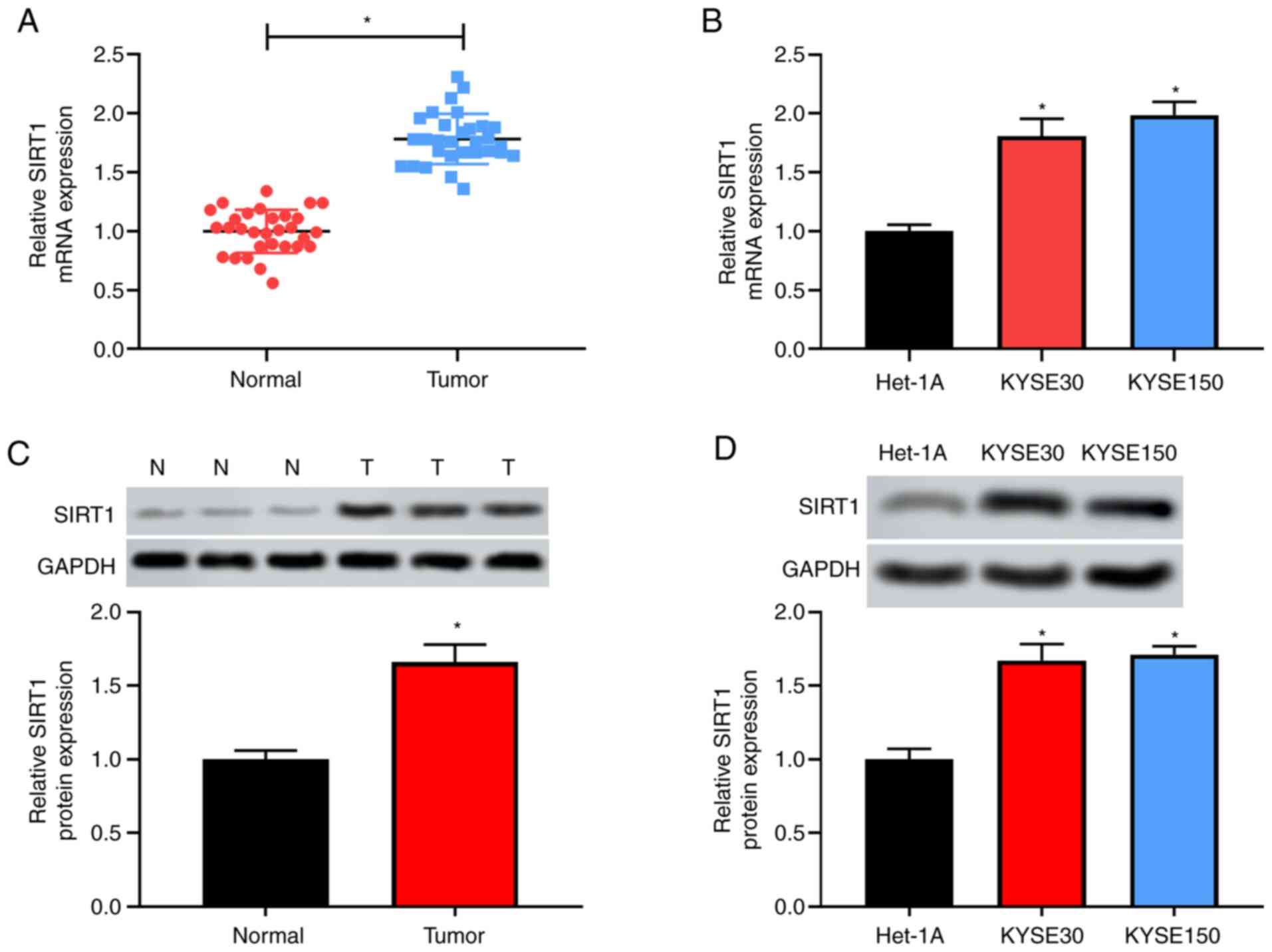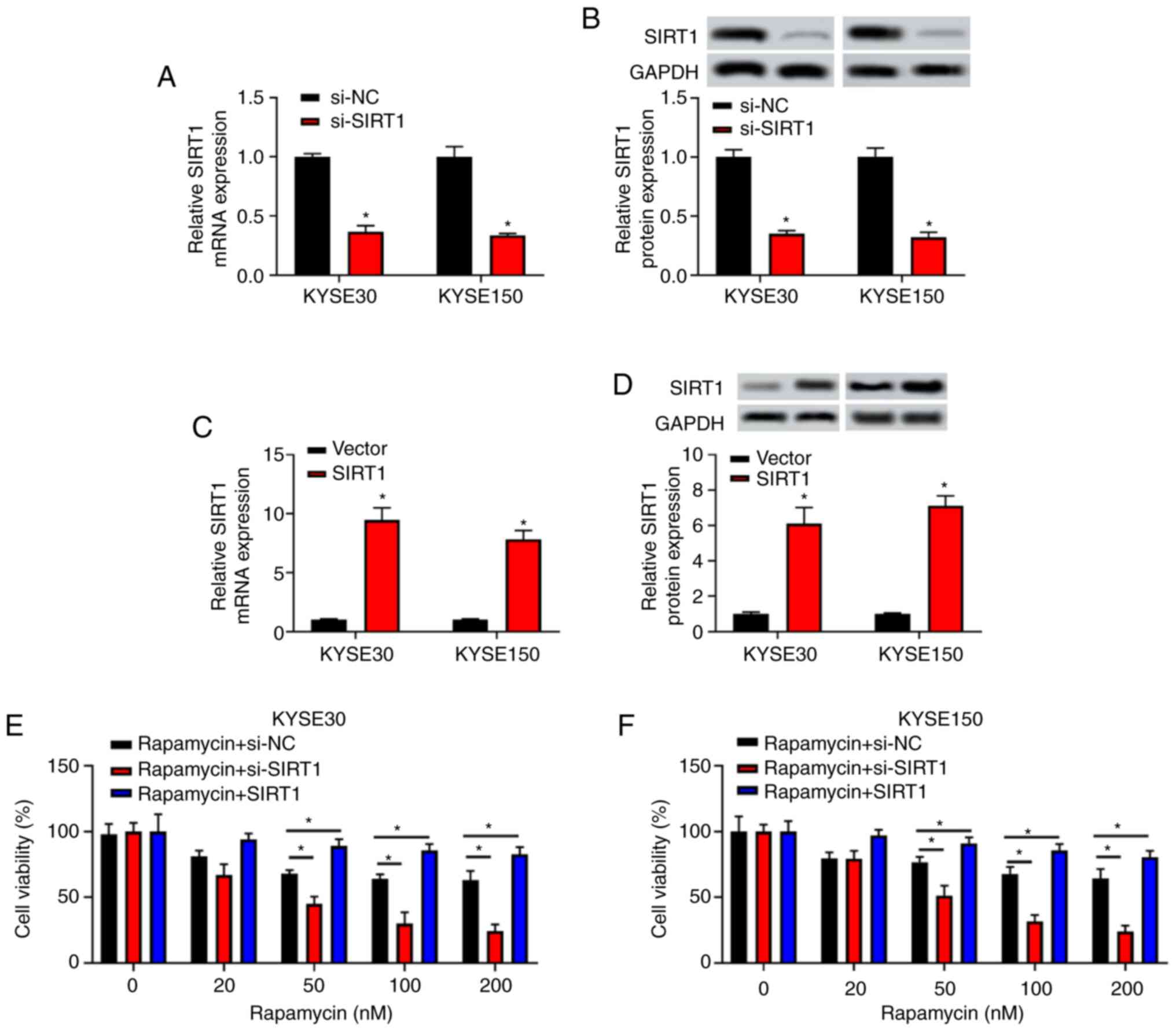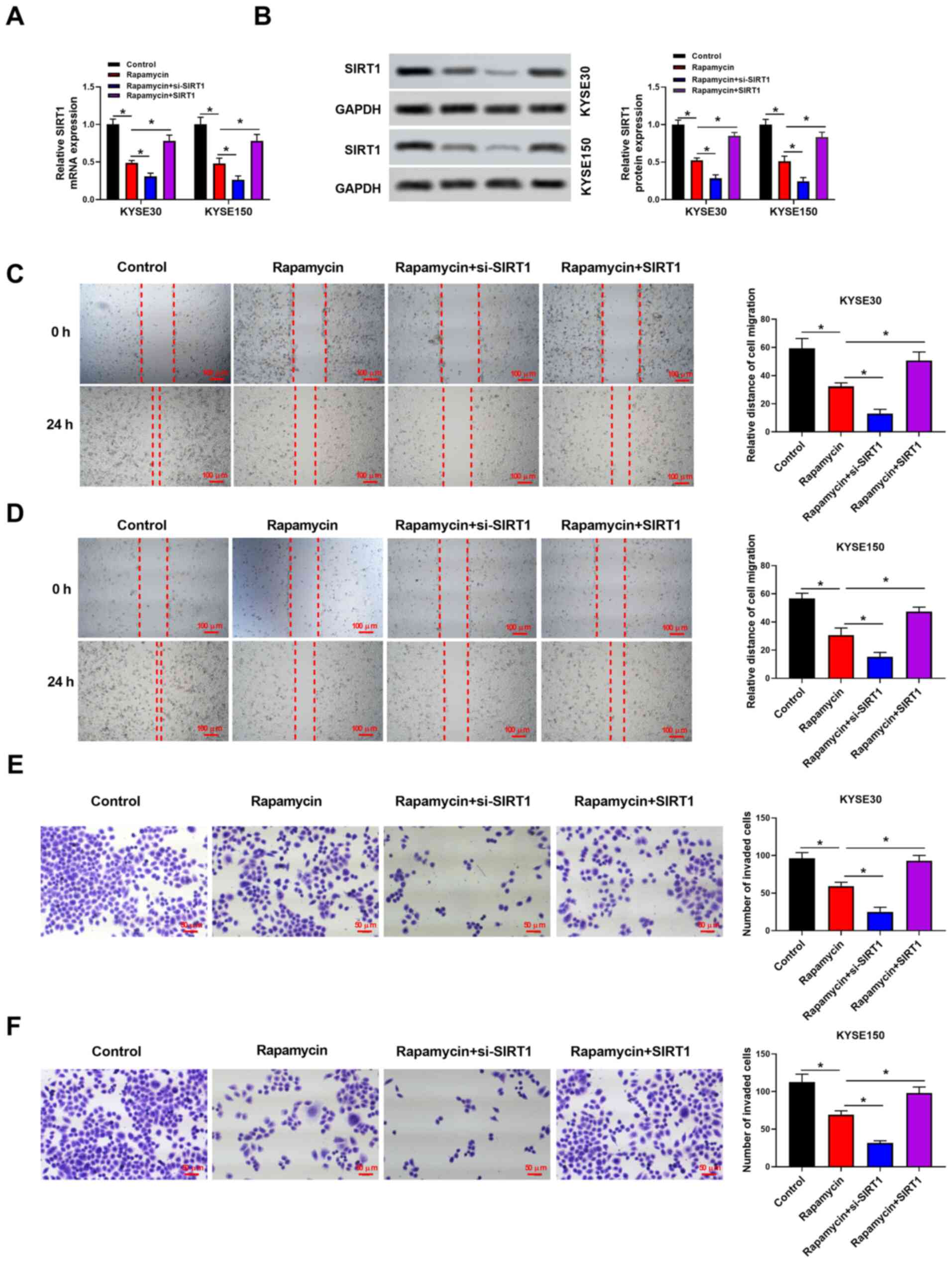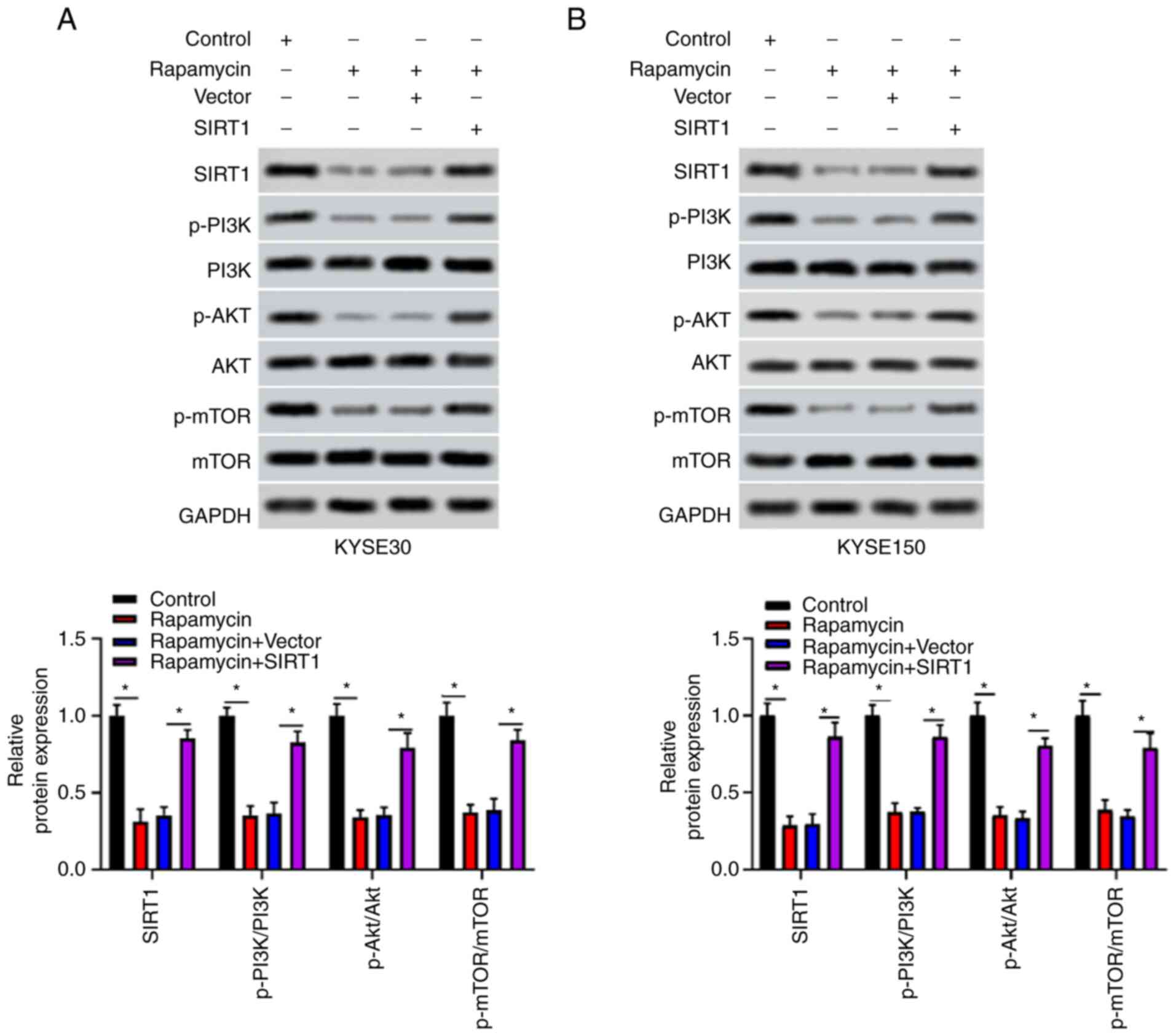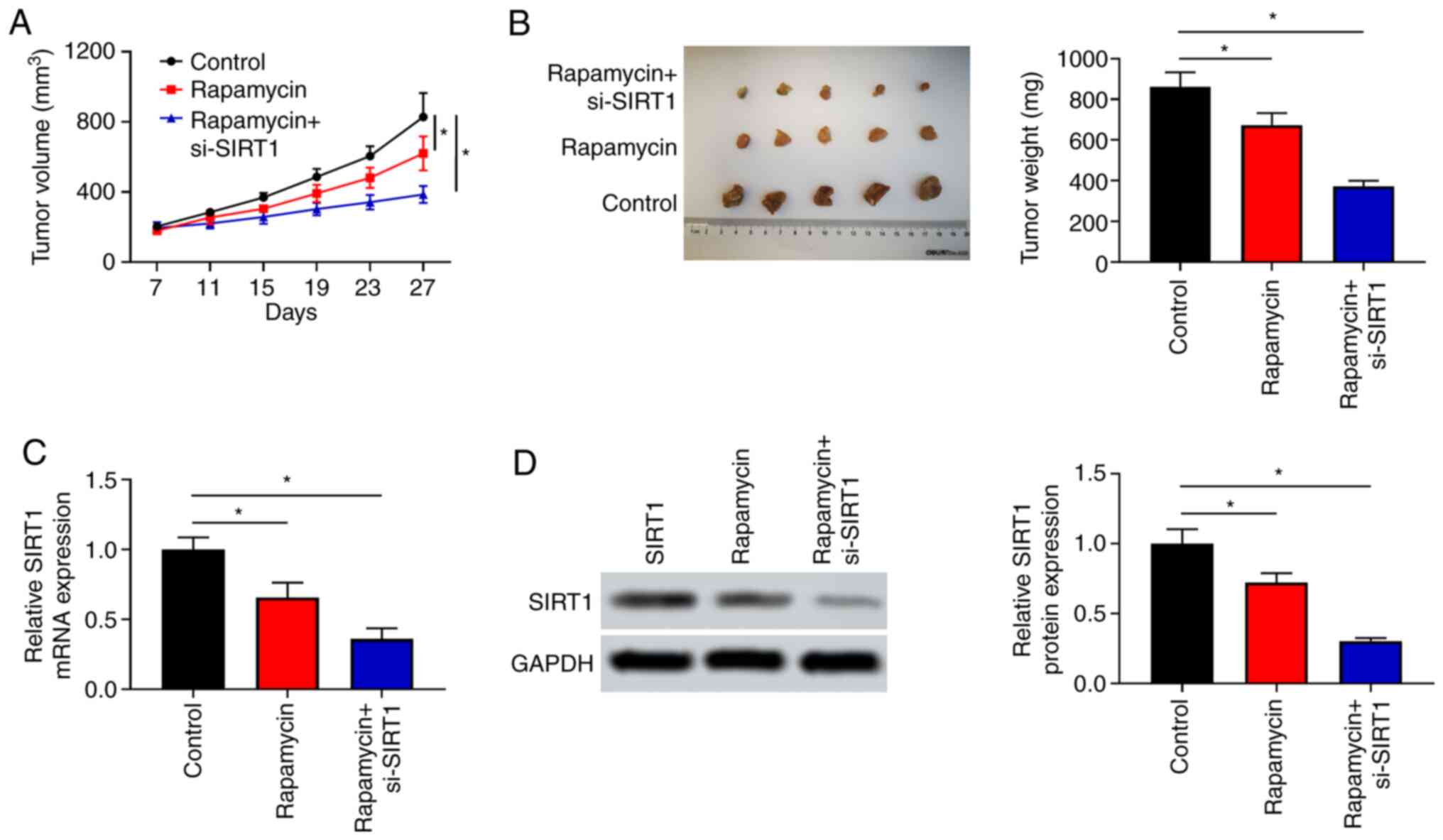|
1
|
Short MW, Burgers K and Fry V: Esophageal
cancer. Am Fam Physician. 95:22–28. 2017.PubMed/NCBI
|
|
2
|
North BJ and Verdin E: Sirtuins:
Sir2-related NAD-dependent protein deacetylases. Genome Biol.
5(224)2004.PubMed/NCBI View Article : Google Scholar
|
|
3
|
Zhang Y: Epidemiology of esophageal
cancer. World J Gastroenterol. 19(5598)2013.PubMed/NCBI View Article : Google Scholar
|
|
4
|
Grabowska W, Sikora E and Bielak-Zmijewska
A: Sirtuins, a promising target in slowing down the ageing process.
Biogerontology. 18:447–476. 2017.PubMed/NCBI View Article : Google Scholar
|
|
5
|
Huang FL and Yu SJ: Esophageal cancer:
Risk factors, genetic association, and treatment. Asian J Surg.
41:210–215. 2018.PubMed/NCBI View Article : Google Scholar
|
|
6
|
Lu Z, Peng K, Wang N, Liu HM and Hou G:
Downregulation of p70S6K enhances cell sensitivity to rapamycin in
esophageal squamous cell carcinoma. J Immunol Res.
2016(7828916)2016.PubMed/NCBI View Article : Google Scholar
|
|
7
|
Du Z, Wang G, Cao Y, Hu CM, Yang K, Liu
YZ, Zhang CZ, Zhang WH, Zhu ZT, Sun HZ, et al: Everolimus-inhibited
multiple isoforms of UDP-glucuronosyltransferases (UGTs).
Xenobiotica. 48:452–458. 2018.PubMed/NCBI View Article : Google Scholar
|
|
8
|
Liu C, Ma T, Jiang T, Jia G, Yang C, Peng
Y, Qian Y, Wang R and Wang S: Abnormal increase of miR-4262
promotes cell proliferation and migration by targeting large tumor
suppressor 1 in gliomas. Pathol Res Pract.
216(152778)2020.PubMed/NCBI View Article : Google Scholar
|
|
9
|
Boland PM and Burtness B: Esophageal
carcinoma: Are modern targeted therapies shaking the rock? Curr
Opin Oncol. 25:417–424. 2013.PubMed/NCBI View Article : Google Scholar
|
|
10
|
Pópulo H, Lopes J and Soares P: The mTOR
signalling pathway in human cancer. Int J Mol Sci. 13:1886–1918.
2012.PubMed/NCBI View Article : Google Scholar
|
|
11
|
Guo W, Qian L, Zhang J, Zhang W, Morrison
A, Hayes P, Wilson S, Chen T and Zhao J: Sirt1 overexpression in
neurons promotes neurite outgrowth and cell survival through
inhibition of the mTOR signaling. J Neurosci Res. 89:1723–1736.
2011.PubMed/NCBI View Article : Google Scholar
|
|
12
|
Chueh S and Kahan B: Clinical application
of sirolimus in renal transplantation: An update. Transpl Int.
18:261–277. 2005.PubMed/NCBI View Article : Google Scholar
|
|
13
|
Hirashima K, Baba Y, Watanabe M, Karashima
RI, Sato N, Imamura Y, Nagai Y, Hayashi N, Iyama KI and Baba H:
Aberrant activation of the mTOR pathway and anti-tumour effect of
everolimus on oesophageal squamous cell carcinoma. Br J Cancer.
106:876–882. 2012.PubMed/NCBI View Article : Google Scholar
|
|
14
|
Zhang J, Peng J, Kong D, Wang X, Wang Z,
Liu J, Yu W, Wu H, Long Z, Zhang W, et al: Silent information
regulator 1 suppresses epithelial-to-mesenchymal transition in lung
cancer cells via its regulation of mitochondria status. Life Sci.
280(119716)2021.PubMed/NCBI View Article : Google Scholar
|
|
15
|
Yang H, Bi Y, Xue L, Wang J, Lu Y, Zhang
Z, Chen X, Chu Y, Yang R, Wang R and Liu G: Multifaceted modulation
of SIRT1 in cancer and inflammation. Crit Rev Oncog. 20:49–64.
2015.PubMed/NCBI View Article : Google Scholar
|
|
16
|
Livak KJ and Schmittgen TD: Analysis of
relative gene expression data using real-time quantitative PCR and
the 2(-Delta Delta C(T)) method. Methods. 25:402–408.
2001.PubMed/NCBI View Article : Google Scholar
|
|
17
|
Milovic V, Teller I, Murphy G, Caspary W
and Stein J: Deoxycholic acid stimulates migration in colon cancer
cells. Eur J Gastroenterol Hepatol. 13:945–949. 2001.PubMed/NCBI View Article : Google Scholar
|
|
18
|
Institute of Laboratory Animal Research,
Commission on Life Sciences, National Research Council. Guide for
the Care and Use of Laboratory Animals. Publication. 327:963–965.
1996.
|
|
19
|
Majumder S, Caccamo A, Medina DX,
Benavides AD, Javors MA, Kraig E, Strong R, Richardson A and Oddo
S: Lifelong rapamycin administration ameliorates age-dependent
cognitive deficits by reducing IL-1β and enhancing NMDA signaling.
Aging Cell. 11:326–335. 2012.PubMed/NCBI View Article : Google Scholar
|
|
20
|
Lv L, Shen Z, Zhang J, Zhang H, Dong J,
Yan Y, Liu F, Jiang K, Ye Y and Wang S: Clinicopathological
significance of SIRT1 expression in colorectal adenocarcinoma. Med
Oncol. 31(965)2014.PubMed/NCBI View Article : Google Scholar
|
|
21
|
He Z, Yi J, Jin L, Pan B, Chen L and Song
H: Overexpression of Sirtuin-1 is associated with poor clinical
outcome in esophageal squamous cell carcinoma. Tumor Biol.
37:7139–7148. 2016.PubMed/NCBI View Article : Google Scholar
|
|
22
|
Guertin DA and Sabatini DM: An expanding
role for mTOR in cancer. Trends Mol Med. 11:353–361.
2005.PubMed/NCBI View Article : Google Scholar
|
|
23
|
Hudes G, Carducci M, Tomczak P, Dutcher J,
Figlin R, Kapoor A, Staroslawska E, Sosman J, McDermott D, Bodrogi
I, et al: Temsirolimus, interferon alfa, or both for advanced
renal-cell carcinoma. N Engl J Med. 356:2271–2281. 2007.PubMed/NCBI View Article : Google Scholar
|
|
24
|
Hou G, Zhang Q, Wang L, Liu M, Wang J and
Xue L: mTOR inhibitor rapamycin alone or combined with cisplatin
inhibits growth of esophageal squamous cell carcinoma in nude mice.
Cancer Lett. 290:248–254. 2010.PubMed/NCBI View Article : Google Scholar
|
|
25
|
Shen Z, Xu L, Li J and Zhang N:
Capilliposide C sensitizes esophageal squamous carcinoma cells to
oxaliplatin by inducing apoptosis through the PI3K/Akt/mTOR
pathway. Med Sci Monit. 23:2096–2103. 2017.PubMed/NCBI View Article : Google Scholar
|
|
26
|
Sohda M and Kuwano H: Current status and
future prospects for esophageal cancer treatment. Ann Thorac
Cardiovasc Surg. 23:1–11. 2017.PubMed/NCBI View Article : Google Scholar
|
|
27
|
Hanigan MH and Devarajan P: Cisplatin
nephrotoxicity: Molecular mechanisms. Cancer Ther. 1:47–61.
2003.PubMed/NCBI
|
|
28
|
Xu Y, Xie Z, Shi Y, Zhang M, Pan J, Li Y
and Lu H: Gefitinib single drug in treatment of advanced esophageal
cancer. J Cancer Res Ther. 12 (Suppl):C295–C297. 2016.PubMed/NCBI View Article : Google Scholar
|
|
29
|
Fire A, Xu S, Montgomery M, Kostas S,
Driver S and Mello C: Potent and specific genetic interference by
double-stranded RNA in Caenorhabditis elegans. Nature.
391:806–811. 1998.PubMed/NCBI View
Article : Google Scholar
|
|
30
|
Hwang B, Madabushi A, Jin J, Lin S and Lu
A: Histone/protein deacetylase SIRT1 is an anticancer therapeutic
target. Am J Cancer Res. 4:211–221. 2014.PubMed/NCBI
|
|
31
|
Qin T, Liu W, Huo J, Li L, Zhang X, Shi X,
Zhou J and Wang C: SIRT1 expression regulates the transformation of
resistant esophageal cancer cells via the epithelial-mesenchymal
transition. Biomed Pharmacother. 103:308–316. 2018.PubMed/NCBI View Article : Google Scholar
|
|
32
|
Sarbassov D, Ali S, Sengupta S, Sheen JH,
Hsu PP, Bagley AF, Markhard AL and Sabatini DM: Prolonged rapamycin
treatment inhibits mTORC2 assembly and Akt/PKB. Mol Cell.
22:159–168. 2006.PubMed/NCBI View Article : Google Scholar
|
|
33
|
Chan T, Rittenhouse S and Tsichlis P:
AKT/PKB and other D3 phosphoinositide-regulated kinases: Kinase
activation by phosphoinositide-dependent phosphorylation. Ann Rev
Biochem. 68:965–1014. 1999.PubMed/NCBI View Article : Google Scholar
|















